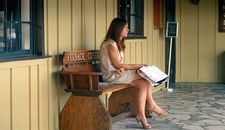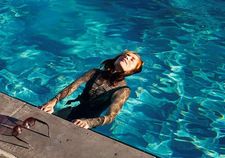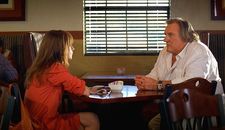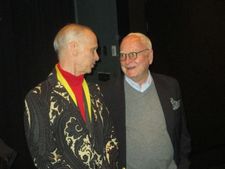_600.jpg) |
| Valley of Love star Isabelle Huppert Photo: Anne-Katrin Titze |
Jeff Nichols' Midnight Special, starring Michael Shannon, Kirsten Dunst and Jaeden Lieberher, prompted Isabelle Huppert to bring up Mud in our conversation on Guillaume Nicloux's haunting Valley Of Love. Anaïs Romand, George Cukor's The Women with Norma Shearer, Joan Crawford and Rosalind Russell and Woody Allen's Magic In The Moonlight came to mind.
Huppert and Gérard Depardieu, last seen on the screen together in Maurice Pialat's Loulou (1980), play a long divorced couple brought together by the death of their son. Similar in effect to what Nicloux did with The Kidnapping of Michel Houellebecq, fictional plot and biographical details merge so that in the end, only truth matters, once it has made its way through fact and fiction.
 |
| Isabelle Huppert: "For me, it's a great film about cinema ..." |
Huppert, whose character is never named, arrives first in Death Valley. We explore with her the motel, the pool, the surroundings, before we even see her face. The bright orange patterned shift dress matches her hair which matches the rusty red bark of the palm trees. The director told me that he tries to not be concerned about costume or set design after having cared too much in the past. Thus it is Isabelle we can thank for choosing the magnificent bathing suit she wears before Depardieu's arrival.
He and she for a while, at least visually, become a regular tourist couple. He has pineapples on his shirt and a scorpion on his red cap; her blouse is aflutter with birds. Death Valley seems populated by people just like them, each carrying their untold story. Nicloux's scenes can be hypnotic and simultaneously preposterous. The afternoon light in the valley is fantastic. She says "your feet look horrible." A lawnmower goes by. He touches her face. He leans in for a kiss. She gives it to him. He says "again".
There is the woman by the pool who knows the exact temperature in Vegas and remembers the castles on the Loire. An old-timer in a bar demonstrates how to curse at bystanders at just the right time and a girl in blue, standing on the blue nightly tennis court, tells Depardieu that she is waiting for him because "it is too hard."
 |
| Isabelle Huppert on her bathing suit: "Yeah, it’s beautiful. I kept it. I think it’s an Eres, you know." |
Anne-Katrin Titze: Let’s talk about the costumes which I found intriguing. In the first shot, you wear that lovely dress, we don’t see your face at all and you are walking. The colour of the bag matches the palm trees and your hair. There is a man who is putting things in a car. This is the first time I thought, this could become part of your story, but it doesn’t.
Isabelle Huppert: Yeah, it goes on.
AKT: But back to the costumes. Next you wear a beautiful bathing suit.
IH [laughs]: You notice everything. You’re so funny. It’s so nice. Yeah, it’s beautiful. I kept it. I think it’s an Eres, you know. They’ve got really beautiful bathing suits. Green and with a strap.
AKT: Criss-crossed in the front, I thought - wow. And then, as soon as Gérard arrives, your costumes become less energetic.
IH: We discussed it a lot with Anaïs Romand, who is a great French costume designer. When she [Isabelle in the film] first arrives off the plane, we didn't go that far that she would arrive in a suit, but she is more urban, let's say. The costume might be less appropriate to the environment. She has a nice dress. Then as it goes, she uses clothes more as equipment. Light trousers and flat shoes because she has to get to be in tune with where she is.
 |
| Isabelle with Gérard in Valley of Love: "It's almost like we're not recognizing each other because it's been such a long time ago." |
AKT: And I also felt, with him. He is not the most sophisticated dresser in this. Somehow both of you become a little Americanised. Yes, he brought the pineapple shirt with him but he is getting the scorpio hat. It's interestingly touristy - how you don't arrive that way but become that. It's another journey, besides the one that's deep and personal.
IH: Yes, but I think that is also a sense of colour. You got the orange dress, then you got this pink T-shirt. I like very much the one I picked out myself. I was in New York before going to [make] the film because I was doing The Maids here. So I had time to look around. I went to this shop downtown where they sell clothes for warm countries and I bought the burgundy trousers.
AKT: Those looked great.
IH: Those are so beautiful. And the shirt - these are American. I wanted that costume because I picked it out. The shirt is a mingle between blue turquoise and black - very beautiful. These are fabrics you use in the desert, really light.
AKT: The cut of the pants is beautiful, too, the higher waist. These are not touristy at all. The palm trees seem to have a life of their own in the film.
_225.jpg) |
| Isabelle with Gérard Depardieu: "Then as it goes, she uses clothes more as equipment." |
IH: Animated.
AKT: In Valley Of Love, you and Gérard develop combined stigmata. You have the markings on the feet and he has them on the hands. Can you talk a little about how you saw this?
IH: I have no explanation. I think it is very different for everybody. There is no rational explanation to that. Either you buy it or not, even as an actress, you know. I couldn't ask Guillaume what does it mean. I think it's a mixture of poetry and it's also metaphorical. It could be also all the wounds that life leaves on you. Particularly the death of a child and how it leaves leftovers on your soul. It's a materialisation of that.
AKT: Which is often what rashes are. You develop a rash from emotional upheaval.
IH: Absolutely. A psychosomatic event.
AKT: There is a detail in that scene that made me jump in my seat, it was so terrifying. When you say there was "a smell" before being pulled by the feet.
IH: A man and a woman. They lost their child, okay. Instead of having the regular agenda - tears, despair, something that you usually face, you have different manifestations of that. It makes it so much more moving, in a way. Everything she says is so rational, so simple, so normal.
_225.jpg) |
| Isabelle Huppert on life's wounds: "I think it's a mixture of poetry and it's also metaphorical." |
But of course it's not normal. How can you smell or imagine that there was somebody? I like the dichotomy between what she says and the simplicity - although she is in big turmoil. She really believed that it happened in a very simple way.
AKT: Have you ever been to a psychic?
IH: Everybody has, more or less.
AKT: In the strangest way, I was actually reminded of Woody Allen's Magic In The Moonlight, which I thought was one of his best in recent years.
IH: Yes. I think [Valley Of Love] is a great film about film itself, about cinema. Great films are always metaphors about the power of cinema. The director would be the child. The director always has to remain invisible, even in the real situation of filmmaking. What else is cinema other than making people believe that it is true, knowing that it is not really true? That is exactly what it says in the film. For me, it's a great film about cinema and the director is the son. He pulls the strings. And we are like puppets and he is the great ordonnateur.
 |
| On Guillaume Nicloux: "The director always has to remain invisible, even in the real situation of filmmaking." Photo: Anne-Katrin Titze |
AKT: It is also the dream of every child - having control over the life of your parents.
IH: Absolutely.
AKT: Was there anything at all improvised in the dialogue?
IH: No, the dialogues were never improvised, except for that scene at the end, the fight. Even when I call him Gérard in the end, I'm not even sure it was written in the script. It was like the movie had something organic that made me proclaim it by calling him Gérard. Only that scene was sort of improvised but the rest was very very much written which was really nice.
AKT: There are some beautiful lines which were startling. "You can only hate an ex you never really loved." Yes.
IH: Which is completely true.
AKT: Completely. I never thought of it before. Are you vegetarian?
IH: Not like her. It's very funny what she says about the mushrooms and everything. I end up not eating much meat but not madly.
AKT: The first encounter between the two of you in the film is so funny, when you walk towards each other. The cinema cliché of the couple in slow motion walking towards each other in a meadow - it is that and not that. It also has something of two animals approaching each other. You are wearing flat sandals for the first time.
 |
| John Waters amuses James Ivory at Valley Of Love premiere Photo: Anne-Katrin Titze |
IH: Absolutely. It's almost like we're not recognizing each other because it's been such a long time ago. It's even more him than her. It is he that she doesn't really recognize because he grew so fat. Which is true for Gérard. He changed a lot, you know.
AKT: I like very much what you said about it being a film about cinema. It deals with the desire that goes into storytelling, doesn't it?
IH: Exactly. The desire to believe in it. When we watch a film, the issue is not just to fulfill our imagination. We need that as much as breathing, actually. This possibility to watch, to enjoy, to feel.
AKT: Right before seeing Valley Of Love I was at a press screening for Jeff Nichols' Midnight Special. The two made for a very inspiring double feature.
IH: I saw Mud. I don't think Midnight Special has come out yet [in France].
Read John Waters on Isabelle Huppert and Isabelle Huppert on John Waters.
Read Guillaume Nicloux on Valley Of Love, The Kidnapping Of Michel Houellebecq and The End.
Valley Of Love opens in the US on March 25.





















